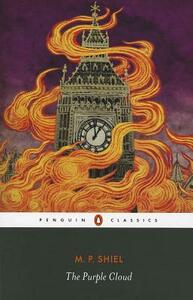Take a photo of a barcode or cover
O mais terrível dos apocalipses: não há zombies ou lento desmoronar da sociedade, apenas um homem sozinho no mundo a lidar com a solidão.
Metto due stelle, ma in realtà è 1,5.
Avrebbe potuto essere un racconto di 40 pagine e lui ne avrebbe guadagnato e io non avrei perso tutto questo tempo
Avrebbe potuto essere un racconto di 40 pagine e lui ne avrebbe guadagnato e io non avrei perso tutto questo tempo
For a full video review visit: https://youtu.be/JH-0CqEkkzM?si=SQ-ZfIt0aAvKs5Hn
Get ready for the Big Weird. Protagonist Adam Jeffson, spurred on by his greedy fiance, connives and murders his way to being the first man at the North Pole (a theme that still belonged to the realm of science fiction at the time of the novel's first publication in 1901). Once there he discovers a mysterious something in the center of a warm lake fed by geothermal springs and, overcome by the Enormity Of It All, faints dead away like many a Lovecraft protagonist. Meanwhile, half a world away a massive supervolcano erupts spewing forth the eponymous Purple Cloud (the language used to describe these events, it must be said, is also quite Purple). Said cloud then crawls across the face of the globe, suffocating everything it comes into contact with and leaving Jeffson to wander aimlessly through a planet-sized tomb, occasionally indulging in the arson of Mankind's greatest cities and the odd bit of necrophilia to pass the time.
If you've a taste for the weird, then there are certainly points where The Purple Cloud delivers in spades. Just be prepared for the narrative to lag in certain spots (the first third, in particular, contains enough impenetrable maritime jargon to fill three Horatio Hornblower novels). I also strongly recommend getting the Penguin Classics edition for it's excellent introduction and notes.
If you've a taste for the weird, then there are certainly points where The Purple Cloud delivers in spades. Just be prepared for the narrative to lag in certain spots (the first third, in particular, contains enough impenetrable maritime jargon to fill three Horatio Hornblower novels). I also strongly recommend getting the Penguin Classics edition for it's excellent introduction and notes.
As an older example of the "last man" story, this one had somehow slipped through my survey of the history of science fiction...for good reason. Quite a slog. Listen, I tire easily of 19th century prose and this thing is the kind of book that has instilled that in me.
A considerable portion of the novel is just the main character going from place to place, taking note of the considerable number of dead bodies left behind by the titular toxic apocalypse. The only noteworthy thing I can say is that Shiel certainly took a chance on the protagonist. Rather than give us a bland everyman, this guy is a real piece of work. Spoilers...
Shiel's theme throughout is the duality of man which he develops by literally having the narrator hear voices--one "white," one "black"--urging him one way or another. What final moral we're supposed to take away from the fact that in his idle hours this lunatic decides to burn down most of the great cities of the world and is only restored to some state of civilization by his predictable late-in-the-game discovery of a lone, nubile female survivor escapes me.
Yeah, just, no.
A considerable portion of the novel is just the main character going from place to place, taking note of the considerable number of dead bodies left behind by the titular toxic apocalypse. The only noteworthy thing I can say is that Shiel certainly took a chance on the protagonist. Rather than give us a bland everyman, this guy is a real piece of work. Spoilers...
Shiel's theme throughout is the duality of man which he develops by literally having the narrator hear voices--one "white," one "black"--urging him one way or another. What final moral we're supposed to take away from the fact that in his idle hours this lunatic decides to burn down most of the great cities of the world and is only restored to some state of civilization by his predictable late-in-the-game discovery of a lone, nubile female survivor escapes me.
Yeah, just, no.
A vast purple cloud sweeps the globe, leaving only one survivor. An early example of a "last man" novel and apocalyptic genre, this is at best a desolate, sweeping landscape, haunted--even by its sole survivor and his struggle to find purpose--and surreal. But the book is dated, with many slow sections (some of which are literal itemized lists) and repetitive pacing. I DNF'd this somewhere past the 50% mark, which I regret because when I was immersed I loved this for its bleak, profound beauty and for place in genre history. But I couldn't push past the weaknesses, and I wouldn't recommend it.
How can I never have heard of this author or this book? Fascinating - supposedly the very first "last man on earth" story.
The main character is unbearable, so I looked into the plot summary on Wikipedia and have to assume the he doesn't change for the better. But mainly, I found that his actions are often not really motivated so that the plot feels unnatural (or rather too natural, as in a novel actions are more streamlined as in real life). In short, the whole thing didn't work for me.
Credo ci siano buchi di trama e salta un po troppo in qua e in là, mi sono un po persa e credo di non averlo capito a pieno
Vedendo recensioni in giro non sono l'unica
Avevo tante aspettative su questo libro quindi è stato deludente... peccato
Vedendo recensioni in giro non sono l'unica
Avevo tante aspettative su questo libro quindi è stato deludente... peccato






